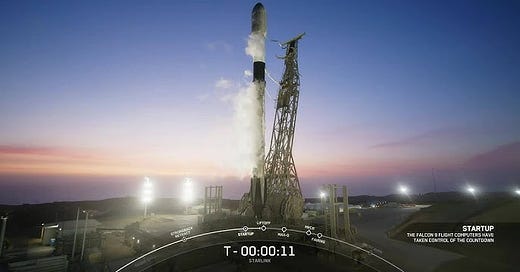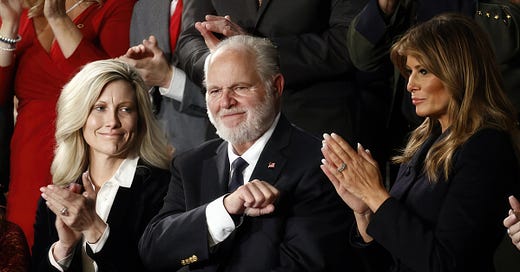

Discover more from @amuse
Weaponizing the California Coastal Commission Against SpaceX & Elon Musk
A Suppression of Free Enterprise and the First Amendment
It is becoming increasingly evident that California’s state apparatus has transformed into a weapon wielded against political dissenters. The latest iteration of this disturbing trend involves the California Coastal Commission's decision to deny SpaceX the opportunity to expand its rocket launches from Vandenberg Space Force Base. Ostensibly responsible for safeguarding California's majestic coastline, the Commission has instead plunged headlong into the domain of political partisanship, leaving environmental concerns by the wayside. This is not about noise, pollutants, or the impact on local wildlife; this is about Elon Musk’s endorsement of Donald Trump. This is about payback from Governor Gavin Newsom's Democratic establishment against an iconoclast who refuses to fall in line. And above all, this is an assault on both the American spirit of enterprise and the foundational principles of free speech.
Chair Caryl Hart and her colleagues made it shockingly clear that their concerns were not rooted in ecological impact or a sober evaluation of potential harm. “We’re dealing with a company, the head of which has aggressively injected himself into the presidential race,” said Hart. Another commissioner, Mike Wilson, echoed these sentiments, alluding to Musk’s wealth and the influence of his social media platform, X. Gretchen Newsom joined the choir by disparaging Musk's alleged politicking and public critiques of federal agencies. Such comments from regulatory officials should send a shiver down the spine of any American who values free speech and enterprise. The California Coastal Commission's actions appear less like environmental stewardship and more like a punitive measure against a political adversary—akin to the kind of authoritarian excess we expect from a banana republic, not from the supposed bastion of American progress.
This attack on SpaceX, a company pushing the boundaries of space exploration and communication, bears a deeper, more troubling undercurrent. It symbolizes the arbitrary consolidation of power within California, where regulators, rather than adhering to the noble pursuit of public welfare, have become the enforcers of Governor Newsom's personal vendettas. Remember, these twelve commissioners are all appointees of California’s Democratic power structure. The Commission’s rejection of SpaceX’s proposal is not a mere coincidence; it is part of a broader pattern of political bullying aimed at those who refuse to bow before Newsom’s progressive orthodoxy. The vitriol against Musk—someone who had the audacity to support free speech, criticize censorship, and endorse a political candidate they abhor—serves as the clearest indicator that the regulatory process has been perverted to serve political agendas rather than the public good.
This charade is not only a targeted attack on Musk personally but a warning to all enterprising spirits in California: fall in line, or face the consequences. Governor Newsom, whose policies have resulted in increased homelessness, rising crime rates, and a mass exodus of citizens, seems determined to ensure that California’s brightest minds and most innovative entrepreneurs find a friendlier climate elsewhere. SpaceX, the very embodiment of American ambition and ingenuity, is now being shackled by the whims of bureaucrats who resent the freedom Musk represents. Indeed, with California's population in decline, one might expect Newsom to welcome industry leaders like Musk, who contribute not just to economic growth but to national prestige. Instead, Newsom’s disdain for dissent has rendered California increasingly inhospitable to the bold and the visionary.
The irony here is inescapable: A regulatory commission, supposedly dedicated to preserving the natural beauty of California, has instead chosen to tarnish its ideological landscape with pettiness and political retribution. The California Coastal Commission, under Newsom’s shadow, has unveiled itself as an entity not of environmental stewardship, but of authoritarian control, eager to punish those who dare to think differently. This blatant misuse of regulatory authority as a tool of political censorship is not just an attack on Elon Musk or SpaceX; it is an attack on the First Amendment. It is an attack on the idea that private citizens and companies should be free to engage in the political process without fearing retribution from an all-powerful state.
California has long prided itself as a beacon of progressivism, but if that light is now aimed at quashing dissent, what kind of progress is it truly promoting? The Coastal Commission’s decision represents a disheartening step toward a totalitarian ethos where political beliefs are policed, and economic opportunities are restricted based on partisan whims. Californians—and all Americans—should ask themselves if this is the precedent they wish to set: a state where political loyalty trumps innovation, where the dreams of rocket builders are grounded not by concerns for the environment, but by the fragile egos of power-hungry politicians. The future should not be held hostage by the spite of the present. SpaceX should be launching rockets, not facing the rocket fire of California's petty autocrats.
If you value free speech and believe in protecting American innovation, let your voice be heard. Share this message, engage in the discussion, and stand up against the weaponization of regulatory bodies. California's future—and America's—depend on our willingness to fight for the freedoms we hold dear.

















